
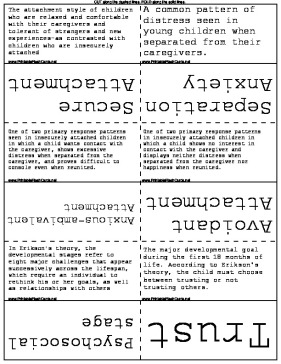
Study the psychological, social, and language development of children and infants with these flash cards.
There are 11 flash cards in this set (2 pages to print.)
To use:
1. Print out the cards.
2. Cut along the dashed lines.
3. Fold along the solid lines.
Sample flash cards in this set:
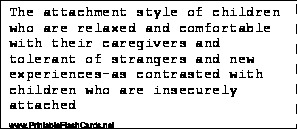
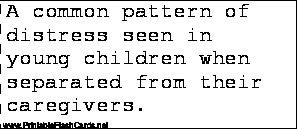
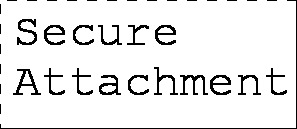
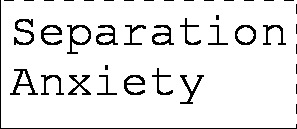
| Questions | Answers |
|---|---|
| The attachment style of children who are relaxed and comfortable with their caregivers and tolerant of strangers and new experiences-as contrasted with children who are insecurely attached | Secure Attachment |
| A common pattern of distress seen in young children when separated from their caregivers. | Separation Anxiety |
| One of two primary response patterns seen in insecurely attached children in which a child wants contact with the caregiver, shows excessive distress when separated from the caregiver, and proves difficult to console even when reunited. | Anxious-ambivalent Attachment |
| One of two primary response patterns in insecurely attached children in which a child shows no interest in contact with the caregiver and displays neither distress when separated from the caregiver nor happiness when reunited. | Avoidant Attachment |
| In Erikson's theory, the developmental stages refer to eight major challenges that appear successively across the lifespan, which require an individual to rethink his or her goals, as well as relationships with others | Psychosocial stage |
| The major developmental goal during the first 18 months of life. According to Erikson's theory, the child must choose between trusting or not trusting others. | Trust |
| The ability to delay instant gratification in pursuit of longer-range positive outcomes. | Self-control |
| Cognitive abilities in the frontal lobes necessary for complex thinking, planning, and goal-directed behavior. | Executive function |
| A biologically organized mental structure in the brain that facilitates the learning of language because (according to Chomsky) it is innately programmed with some of the fundamental rules of grammar. | Language Acquisition Device (LAD) |
| The productive of repetitive syllables, characteristic of the early stages of language acquisition. | Babbling |
| The rules of a language, specifying how to use the elements of language and word order to produce understandable sentences | Grammar |